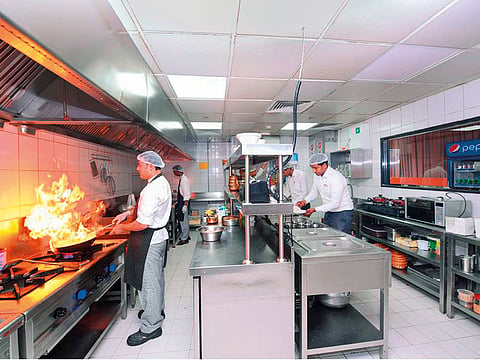Supermarket food counters sour UAE restaurant prospects
Growing popularity of concept piles pressure on a sector that has already seen many businesses close

Dubai: The growing popularity of food counters at supermarkets is starting to eat into the fortunes of the UAE’s restaurant sector, market sources say. And it may be getting more so at a time when consumers are still extra wary of the value-added tax (VAT) element in their bills.
“The weekend numbers at restaurants, especially those aimed at the mid-income, are down in a big way since the start of the year,” said Biju Koshy, managing director at Tharavad, which operates casual dining outlets in Dubai and the northern emirates.
“And even the lunch-time office crowds are not to be seen as in the past. We believe much of the buying is being diverted to supermarket food counters and this will have serious cashflow consequences for restaurant operators. Supermarkets have become particularly active in offering meal options that meet every type of shopper interest. When meals are available at prices lower by Dh5 or more compared to what you pay at a restaurant, it will prove an easy sell.
“For anyone wanting to get into the F&B business now, it’s best they rework their plans for a break-even in three years. It will take much longer than that.”
Even those retailers without a supermarket heritage are getting into the act now, most notably the Landmark Group’s entry with the Viva brand. Viva’s primary focus is to be a “food discounter”.
There is another threat restaurant operators are facing, in the form of online promotional discounts to dine out. And when such offers are proliferating, there is less incentive for consumers to head to a restaurant and foot the full bill.
For local restaurant operators, these are all threats they need find solutions to. But so far, quick fixes are proving elusive.
Many in the F&B industry here have in recent months been issuing stark warnings that the good run the sector has had since 2011 is coming to an end. They point to the number of businesses that have gone kaput and that this year could well see more joining their ranks.
And yet new F&B concepts keep coming. While food courts at malls are obvious attractions, the action is hitting all of the streets and communities in Dubai. Where there used to be a grocery store on the ground floor, chances are these would be taken up by a restaurant or a cafe these days. It is true for both residential neighbourhoods and where office buildings predominate.
“Despite everything you see happening, new entrants are still channelling in considerable funds to launch their concepts,” said Koshy. “And you always get the feeling that some of the investments are excessive.”
Koshy’s company has just taken up a minority stake in an Indian casual dining concept called Two Seasons in Karama. The plan is effect a financial turnaround by mixing up the menu options and thus widening the target audience.
“At some point, consumers in the UAE will adjust to the VAT costs... but sentiments need to change and that might take longer,” he added. “Much depends on the financial resources one can draw on until things improve.”
Sign up for the Daily Briefing
Get the latest news and updates straight to your inbox


